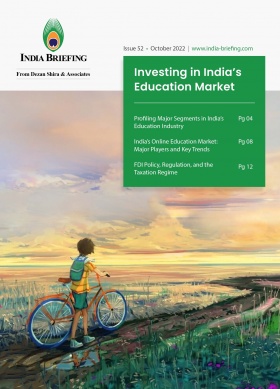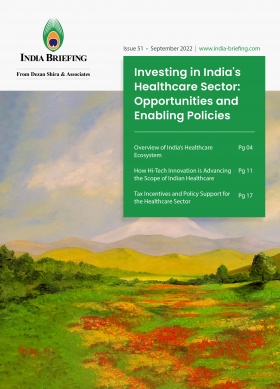Toy Manufacturing in India: Government Considering PLI Scheme Worth INR 35 Billion
Toy manufacturing in India is set to get a boost with a new production-linked incentives (PLI) scheme in the works for the sector. Consultations with key stakeholders have been ongoing over the last 2-3 years as local players have sought support for infrastructure upgrades, technology, and ecosystems in place to set up efficiently.
As per the IBEF, India’s toy retail market was valued at around INR 160 billion (US$ 2.2 billion) in 2020, or less than one percent of the global market. In 2021, about 85 percent of the domestic demand for toys was met through imports, of which 80 percent imports were from China, with the remainder sourced from Sri Lanka, Malaysia, Germany, Hong Kong, and the US.
Demand for toys is only set to increase in India driven by a young population, rising disposable incomes impacting spending patterns, and shift from traditional toys to innovative, intelligent electronic toys.
A robust toy making industry in India will not just create jobs, but will also enhance exports, which align with top government objectives. We discuss some of the latest developments that could facilitate manufacturing growth in India’s toy sector.
PLI scheme for toy manufacturing in India in the works
As per media reports quoting government officials, the “discussions for PLI for toys are at an advanced stage.” The proposed outlay for the scheme is about INR 35 billion (approx. US$423 million) and the investment slab for availing the PLI incentives could be kept as low as INR 50 million (approx. US$605,532) to encourage micro, small, and medium enterprises (MSMEs).
Further, the proposed PLI incentives will be eligible for manufacturers of finished toy products and not toy components. This is because the Indian toy sector is heavily dependent on import of raw materials and components, such as electronic components for toys and fabric for soft toys.
Through the PLI, India’s capacity for making traditional and mechanical toys is sought to be built up.
Toy sector in India – regulation and new manufacturing clusters
Import duties
To give a leg up to India’s domestic toy manufacturing industry, the government implemented hikes in import duties on toys – from 20 percent to 60 percent starting February 2020.
Since the import duty hikes, major toy imports have reportedly declined 70 percent to INR 8.77 billion (US$110 million) in 2021-22 from US$371 million in 2018-19, while Indian export of toys increased 61.39 percent to US$326 million from US$202 million in the same period, according to government figures.
Given the high import tariffs, many players are importing only toy components and assembling toys in India.
Quality control
To eliminate the sale of unsafe, substandard, counterfeit, and cheap (due to use of low quality, toxic materials) toy products in the Indian market, the Department for Promotion of Industry and Internal Trade (DPIIT) has issued the Toys (Quality Control) Order, 2020. The Toys QC Order (QCO), 2020 came into effect January 1, 2021.
Rules in the QCO are framed under Section 16 of the BIS Act, 2016, and make it mandatory for toys for children aged 14 years or younger to conform to seven Indian Standards for Safety of Toys. These prescribe the requirements for physical, chemical, and electrical safety of toys.
Toys must also bear the “ISI Mark,” provided by the license from the Bureau of Indian Standards (BIS), to be sold in India. No person or entity is permitted to manufacture, import, sell, or distribute, store, hire, lease or exhibit for sale toys that do not conform to the BIS standards or do not possess the ISI Mark.
The BIS grants the license to use the ISI mark on the toy after conducting an onsite factory assessment of the unit’s manufacturing and testing capability as well as testing the toy products in a BIS Lab or BIS Recognized Lab as per the Indian Standards.
Sample testing for imported toys is mandatory from September 1, 2020. The quality check is done at the factory location of the imported source and a second quality check is done after the shipment reaches India.
For instance, the toys are tested to examine if they present a choking hazard, or have sharp points or edges that can injure a child. The tests also determine the presence / concentration of certain toxic elements like arsenic, chromium, lead etc. in the toys to ensure that they are within safe limits.
More than 900 toy manufacturers, mostly from the MSME sector, have been licensed with BIS certification.
Emerging toy clusters
About 90 percent of the Indian toy industry is unorganized with more than 4,000 MSME enterprises across the country. Most toy manufacturers are in Delhi NCR, Maharashtra, Karnataka, and Tamil Nadu, besides small clusters in other central Indian states.
India only recently turned its attention to the toy sector to boost domestic manufacturing capacity (see 2020 National Action Plan below). In 2020, the central government announced the ‘Product Specific Industrial Cluster Development Programme’ to build toy clusters on dedicated SEZs and help them become customized, self-sustained ecosystems catering to export markets.
Consequently, two major toy clusters are being set up in the country as respective states offer incentives to access land and set up. These are the Toy Park at Greater Noida in the northern state of Uttar Pradesh and the Koppal Toy Cluster in Karnataka in the south.
Noida’s Toy Park, near Jewar airport site
Overseen by the Yamuna Expressway Industrial Development Authority (YEIDA), 134 companies have acquired land to set up their toy factories at an investment of INR 4.10 billion (US$49.71 million). This is set to create 6157 permanent jobs.
Companies reported to be investing include Fun Zoo Toys India, Fun Ride Toys LLP, Super Shoes, Ayush Toy Marketing, Sunlord Apparels, Bharat Plastics, Jai Shree Krishna, Ganpati Creations, and RRS Traders, among others.
Products that will be incentivized at the Toy Park include stuffed, electronic, plastic, and silicon toys. Regional artisans making wooden toys will also be incentivized to set up here.
The Uttar Pradesh government has demarcated 100 acres in Sector 33 of the YEIDA area (Greater Noida) for the toy industry. A 5-acre area has been allotted for companies to display and advertise their toy products.
In late October, it was reported in the Hindustan Times, that YEIDA will issue a lease plan for about 70 industrial plots and offer possession to their owners by end of November. The goal is to begin toy manufacturing in the area by 2023. Once developed to full capacity, YEIDA’s chief executive officer Arun Vir Singh expects the 28 units already in possession to attract INR 10 billion (US$121.22 million).
Annual toy fair
A three-day business-to-business fair toy and games fair was held August 26-28 this year in collaboration with the textiles and commerce ministries in Greater Noida’s India Expo Center and Mart.
The toy fair intends to capture global market share of toys and games in the future and boost the local manufacturing industry.
Khilona 2023 is planned for August 18-20, 2023 at the same venue, and B2B registrations are open for overseas buyers, buying and sourcing consultants, domestic volume buyers, and general domestic visitors.
Koppal Toy Cluster in northwest Karnataka
India’s first toy cluster is located at Koppal, in a remote part of northwest Karnataka in south India. Set up by Aequs Infra, a group company of Belagavi-based Aequs Pvt. Ltd, the cluster began operations this year.
The Koppal Toy Cluster is spread over 400 acres and is a fully integrated system comprising special economic zone (SEZ) for exports, domestic tariff area (DTA) to tap into the Indian market, and free trade warehousing zone (FTWZ) facilities. This will serve as an ideal mix for local toy makers and overseas manufacturers.
The Koppal cluster will host an entire toy manufacturing ecosystem to support toy makers, suppliers, and vendors across the toy value chain. The cluster will provide social infrastructure and residential accommodation for workers, as well as skilling initiatives.
Koppal has easy connectivity with major trade hubs like Hubballi and Bengaluru.
The cluster aims to generate over 25,000 direct jobs and 100,000 indirect jobs across a decade. It is projected to attract investments worth INR 40 billion (US$483.26 million).
Speaking to The Hindu back in January, CEO and chairman of Aequs, Aravind Melligeri said that six toy and toy-component makers had signed MoUs with Aequs Infra while three other players, including Viscon Polymers, manufacturer and exporter of custom rubber molded products, have started construction of their production facilities at the Koppal cluster.
National action plan for toy sector
India has developed a comprehensive action plan to boost local manufacturing and incentivize toy and handicraft manufacturers to make India the next global toy production hub.
Released by the DPIIT and commerce ministry in 2020, and to be implemented in collaboration with 14 federal ministries, including education, textiles, railways, science and technology, and information and broadcasting, the following action items have been outlined in the plan to support the toy ecosystem:
- Setting up toy production clusters across the country
- Launching central government schemes to incentivize manufacturing and exports
- Strengthening the R&D infrastructure for toys and games promoting self-discovery and self-learning
- Integrating toys and games with education, specifically for subjects such as mathematics, history and science
- Increasing awareness among consumers via outreach campaigns to boost purchase of local toys
- Promoting innovation & design and upskilling artisans
- Creating a working group for ‘Ek Bharat Shrestha Bharat’
- Meeting crowdsourcing procurement needs to boost demand
- Utilizing analytics and digital marketing tools for targeted brand promotions
- Organizing hackathons and grand challenges to encourage design and innovation
- Building toy repository centers
- Promoting development of digital and online games
- Developing toy laboratories to test and monitor quality & safety standards
- Organizing annual toy fairs and exhibitions across production hubs
- Focusing on production of mechanical and electronic toys
- Observing an annual ‘Made in India Toy Day’ in schools
- Strengthening awareness and production of indigenous toys such as puppets, wooden dolls, clay toys and tribal games
- Airing special programs on toys and games on public broadcast channels, such as Doordarshan (DD) and All India Radio (AIR)
- Promoting toys made with recycled and upcycled materials
- Developing an e-commerce platform to provide a centralized direct marketing portal to handicraft artisans
- Building India’s first ‘Toy Museum’
About Us
India Briefing is produced by Dezan Shira & Associates. The firm assists foreign investors throughout Asia from offices across the world, including in Delhi and Mumbai. Readers may write to india@dezshira.com for more support on doing business in in India.
We also maintain offices or have alliance partners assisting foreign investors in Indonesia, Singapore, Vietnam, Philippines, Malaysia, Thailand, Italy, Germany, and the United States, in addition to practices in Bangladesh and Russia.
- Previous Article 2022 Winter Session of the Indian Parliament: A Look at Key Bills
- Next Article Uttar Pradesh’s New Industrial Policy 2022: North Indian State Seeks to Pull in More FDI









